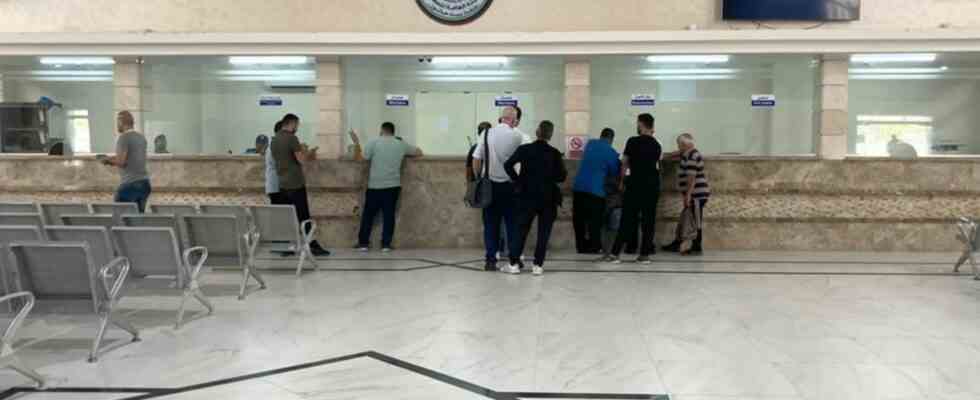Living in Gaza – Working in Israel
Workers stand at Hamas’ Erez checkpoint. photo
© Christina Storz/-/dpa
Thousands of workers from the Gaza Strip cross the border into Israel every day. The government there wants to create more security with economic incentives. Is that enough to end the violence?
When Masen Madhun from Gaza got his work permit six months ago, there was a big party. Since then, the 52-year-old has been making his way to Israel every day at 4 a.m. In Ashkelon, 90 kilometers away, he works on a construction site. “It’s excellent work with a good salary,” he says happily to this day. In the evening it goes back to the wife and the nine children.
He is happy that he now has the opportunity to work in Israel again. He worked there a lot when he was 14. “It was easy back then, but then the ban came.” After the Islamist Hamas seized sole power in Gaza in 2007, Israel imposed a blockade on the coastal strip due to security concerns, which Egypt also supports. Permission is required to leave the area.
economy for safety
Around half of the 2.2 million people in Gaza are unemployed today. The rate is particularly high among university graduates. According to the UN Emergency Relief Office (Ocha), more than 60 percent of the residents are dependent on relief supplies. Clean water is scarce, electricity is only available for a few hours a day.
A U-turn came last year with the new Israeli government. The motto: economic incentives in exchange for more security. This also included issuing several thousand work permits, which was then gradually increased. A few days ago Secretary of Defense Benny Gantz approved another increase to 15,500.
This is also noticeable at the border: In July, the Israeli authorities allowed 40,500 people to leave the country – according to the UN, more than at any time since 2005. Around 20 years ago there were ten times more. In addition to work, medical emergencies can also be a reason for an entry permit.
Hoping for permission
Fida Abu Drah would like to be one of the “lucky ones”. For a year now, the 34-year-old has been coming to the liaison office in Gaza City, which issues the permits, every day. “The hard part is the waiting,” he says. “When I heard that there were more permits again, I had hope.” It shows its status on an app: “Under review.” For how much longer? No idea. He doesn’t want to be photographed – he’s too worried about a rejection. Five other men stand around him and report similar things.
Palestinian economist Mohammad Abu Jayab estimates that a total of 90,000 Palestinians from Gaza are waiting for an answer. “When the confirmation comes, it’s celebrated like at a wedding – with dessert for everyone.” The most common reason for cancellation is safety concerns.
Both sides benefit
According to experts, a first success of the measures for Israel could be observed during the most recent conflict at the beginning of August. Unlike the Palestinian organization Islamic Jihad, the militarily stronger Hamas did not take part in the fighting this time. It also sees itself responsible for the well-being of the civilian population. “The people of Gaza cannot stand another conflict,” says Jochanan Zoref, an expert on Israeli-Palestinian relations at the Institute for National Security Studies (INSS). Hamas knows that too.
While a worker in Gaza earns between 20 and 50 shekels a day (6 to 15 euros), in Israel he can earn up to 400 shekels (150 euros). “Money that is urgently needed in Gaza – also to boost purchasing power,” says economics expert Abu Jayab. He doubts that the workers exerted direct pressure on Hamas. The number is still too small for that. “Maybe 50,000 would change something, also with regard to the many family members who depend on their income”.
But the labor market in Israel is also benefiting, says economic researcher Haggay Etkes from INSS. “Specialists are urgently needed.” The labor market is very tight. Workers from Gaza are reliable and well trained. Most work in construction, others in agriculture, but also in other areas.
dependence on Israel
The past few months have shown how quickly the number of work permits can be reduced again and the borders closed. Gantz had already announced the increase in July, but suspended it again after rocket fire. He blamed Hamas for the attack. She must also bear the consequences.
Shortly thereafter, after the arrest of a jihad leader, Israel sealed off the entire border region for fear of attacks. No worker could cross the border for a week. The import of relief goods was also prohibited.
Masen Madhun and his family lost a quarter of their income. “We sat at home and waited,” he says. Others, however, got stuck in Israel during the time, reports trader Mohammad Nasser. You then get a call to stay where you are. When the border is open again, it goes back to the family in Gaza.

